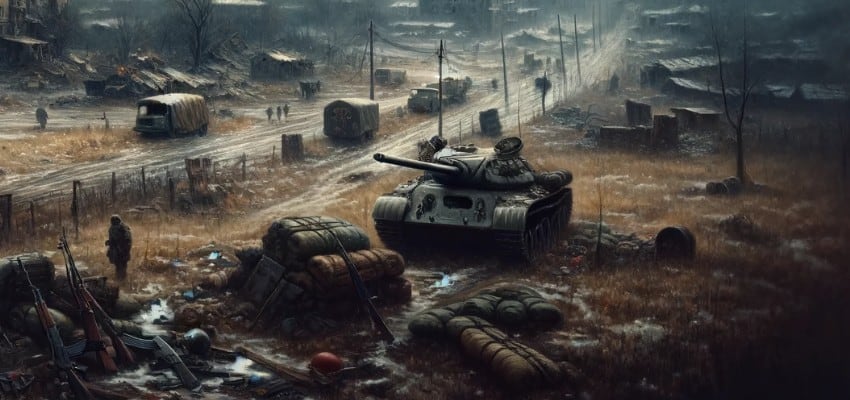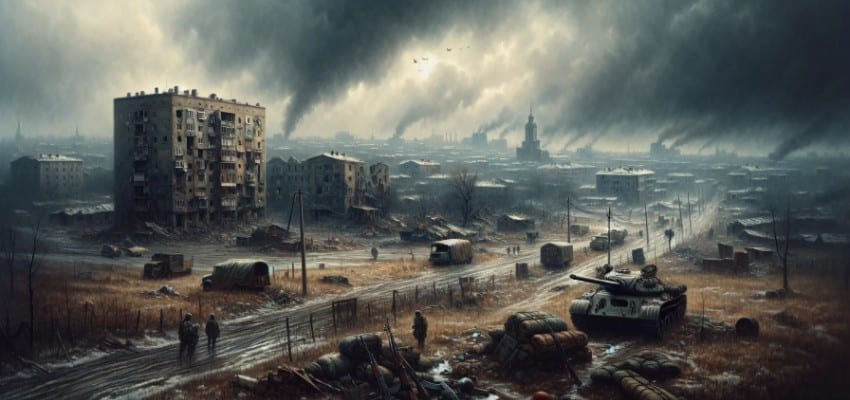|
|
Content Assessment: Battlefield to Geopolitics: Russia's Extended Offensive and Ukraine's Defiant Stance
Information - 92%
Insight - 90%
Relevance - 90%
Objectivity - 93%
Authority - 95%
92%
Excellent
A short percentage-based assessment of the qualitative benefit expressed as a percentage of positive reception of the recent synthesis of reporting from the Institute for the Study of War on the Russo-Ukrainian War.
Source Note: One of the most accurate and detailed sources for ongoing updates on the Ukraine crisis is the Russian Offensive Campaign Assessment from the Institute for the Study of War. The Institute for the Study of War (ISW) is a 501(c)(3) organization and produces strictly non-partisan, non-ideological, fact-based research. ISW seeks to promote an informed understanding of war and military affairs through comprehensive, independent, and accessible open-source research and analysis. ISW’s research is made available to the general public, military practitioners, policymakers, and media members. Providing a daily synthesis of key events related to the Russian aggression against Ukraine, ISW updates may benefit investigators and litigators as they follow the business, information technology, and legal trends and trajectories impacted by and stemming from the current Russo-Ukrainian conflict.
For those seeking to grasp the full scope of this evolving landscape, the complete updates from the Institute for the Study of War serve as an invaluable resource.
Russo-Ukrainian Conflict Update*
Battlefield to Geopolitics: Russia’s Extended Offensive and Ukraine’s Defiant Stance
ComplexDiscovery Staff
As the Russian offensive in Ukraine continues, the situation on the ground evolves with new strategic developments and shifting geopolitical dynamics. This comprehensive assessment, drawing from the latest insights as of December 15, 2023, covers the intricate military, political, and diplomatic facets of the ongoing conflict.
The German media outlet BILD, on December 14, citing intelligence sources, revealed Russia’s ambitious plan to significantly extend its military occupation in Ukraine beyond the four annexed oblasts through 2024-2026. According to these reports, Russia aims to capture the entirety of Donetsk and Luhansk oblasts and push forward to the Oskil River in Kharkiv Oblast by the end of 2024. The strategy further involves expanding control into large parts of Zaporizhia and Dnipropetrovsk, including Kharkiv City, in the subsequent years. This territorial ambition is underpinned by a heavy reliance on Russia’s defense industrial base, a readiness to sustain high military casualties, and an opportunistic eye on the potential shifts in US foreign policy following the 2024 presidential elections. Eerily reminiscent of the Second Minsk Agreement in 2015, Russia’s approach reportedly includes deceptive negotiations, using diplomatic talks as a smokescreen for military advancements.
The Institute for the Study of War (ISW) notes that while it cannot independently verify BILD’s intelligence, the overarching narrative of these plans aligns with Russia’s visible preparations for a protracted war. This includes the restructuring of military forces and the mobilization of its defense industry, signaling a long-term commitment to the conflict. The recent escalation in expansionist rhetoric from Russian officials, including President Putin, particularly focusing on regions in Kharkiv Oblast, further corroborates this assessment. These developments suggest a strategic pivot in Russia’s military objectives, aiming to consolidate and expand territorial gains.
From the Ukrainian perspective, Lieutenant General Kyrylo Budanov of the Main Military Intelligence Directorate (GUR) indicates that Russia shows no sign of altering its war strategy into 2025, barring significant changes on the battlefield. In a striking contrast, Ukrainian Foreign Minister Dmytro Kuleba, in his op-ed in Foreign Affairs, emphasizes Ukraine’s unwavering commitment to its military goals. He underscores the criticality of continued Western military aid, the rapid development of industrial capacities, and a realistic approach towards any negotiations with Russia. Kuleba’s commentary reflects a profound understanding of the conflict’s dynamics, acknowledging the challenges while reaffirming Ukraine’s resolve.
The military situation on the ground remains tense and dynamic. The night of December 14-15 witnessed a surge in Russian missile and drone strikes across Ukraine, challenging the country’s air defenses. Ukrainian forces, demonstrating remarkable resilience, successfully intercepted numerous aerial threats, including sophisticated Shahed drones and Kinzhal missiles. These engagements highlight the escalating intensity of the conflict and the advancing technological warfare employed by Russia.
Alongside the conventional military engagements, the conflict sees an unfolding of hybrid warfare tactics. A notable development in this arena is Finland’s response to Russian orchestrated migrant crises. On December 15, Finland closed its border checkpoints with Russia, a defensive move against Russian hybrid warfare tactics aimed at destabilizing the region. This action underscores the broader implications of the conflict, extending beyond the immediate military engagements in Ukraine.
In a significant boost to Ukraine’s defense, Germany, on December 14, announced a comprehensive military and humanitarian aid package. This includes the provision of a Patriot air defense system, ammunition, mine clearing systems, and essential winter supplies. Germany’s robust support exemplifies the critical role of international aid in sustaining Ukraine’s resistance against the Russian offensive.
As the conflict extends into its second year, it increasingly resembles a protracted and expansive military campaign. Russia’s strategy, characterized by a combination of military force, industrial mobilization, and manipulative diplomatic maneuvers, aims to reshape the geopolitical landscape of Eastern Europe. In response, Ukraine’s determined resistance, underpinned by international support, highlights a strategic persistence against overwhelming odds. The situation underscores the critical importance of sustained Western aid and the perils of a premature ceasefire, which could inadvertently advance Russian military objectives.
This narrative, encapsulating the complex and evolving nature of the Russian-Ukrainian conflict, reflects a confrontation that is deeply entrenched and multifaceted. The strategic persistence of Russia, countered by Ukraine’s resilient defense and backed by international diplomatic and military support, shapes a landscape marked by enduring tension and uncertainty. As the conflict continues to unfold, its outcomes remain pivotal to the future stability and security of the region.
Additional Information
- Institute for the Study of War (understandingwar.org)
- High Stakes on the Eastern Front: Russia’s Uphill Battle in Ukraine (December 7, 2023) (complexdiscovery.com)
We do not report in detail on Russian war crimes because those activities are well-covered in Western media and do not directly affect the military operations we are assessing and forecasting. We will continue to evaluate and report on the effects of these criminal activities on the Ukrainian military and population and specifically on combat in Ukrainian urban areas. We utterly condemn these Russian violations of the laws of armed conflict, Geneva Conventions, and humanity even though we do not describe them in these reports.
Detailed Reporting with Maps for December 15, 2023, from the ISW – Mouseover to Scroll
2023-12-15-Russian Offensive Campaign AssessmentReview the Detailed Reporting and Maps PDF
About the Institute for the Study of War Research Methodology
ISW’s research methodology relies on both primary and secondary sources, enabling researchers to develop a comprehensive understanding of the situation on the ground. In order to analyze military and political developments in any given area, ISW’s research analysts must wholly understand the systems of enemy and friendly forces. They must also understand the population demographics, physical terrain, politics, and history of that area. This lays the analytical foundation for understanding the reasons for particular developments and fulfilling their assigned research objectives. ISW analysts also spend time in places like Iraq, Afghanistan, and elsewhere in order to gain a better understanding of the security and political situation and to evaluate the implementation of current strategies and policies. Our researchers compile data and analyze trends, producing a granular analysis of developments in areas of research, producing an accurate, high-resolution, timely, and thorough picture of the situation. ISW’s research methodology guarantees its success and commitment to improving the nation’s ability to execute military operations, achieve strategic objectives, and respond to emerging problems that may require the use of American military power.
About the Institute for the Study of War
The Institute for the Study of War advances an informed understanding of military affairs through reliable research, trusted analysis, and innovative education. We are committed to improving the nation’s ability to execute military operations and respond to emerging threats in order to achieve U.S. strategic objectives. ISW is a non-partisan, non-profit, public policy research organization.
Learn more, get involved, and contribute today.
Additional Reading
- From Dissent to OSINT? Understanding, Influencing, and Protecting Roles, Reputation, and Revenue
- [Annual Update] International Cyber Law in Practice: Interactive Toolkit
- Data Embassies: Sovereignty, Security, and Continuity for Nation-States
Assisted by GAI and LLM Technologies
* Sourced and shared with direct express permission from the Institute for the Study of War (ISW).
Source: ComplexDiscovery





































